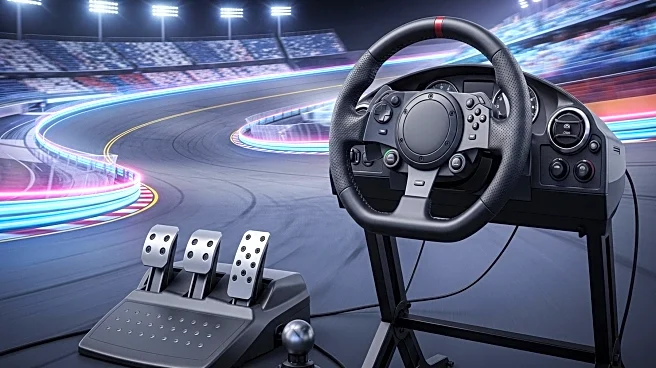What is the story about?
What's Happening?
A five-year-old sim racer named Emerson has captured attention with his impressive performance in a virtual NASCAR Truck Series race at Daytona. In a video shared on the Instagram account 'Emerson Drives,' managed by his parents, Emerson is seen skillfully maneuvering his truck to finish eighth, overtaking several competitors in the process. The video highlights his focus and determination, with guidance from a person, likely his father, who instructs him on when to accelerate and decelerate. This young racer's performance has sparked interest in the potential of sim racing as a training ground for future professional drivers. The accessibility of advanced simulators has been increasingly recognized as a valuable tool for both young and veteran drivers, offering a cost-effective alternative to traditional karting.
Why It's Important?
The rise of sim racing as a legitimate training platform for aspiring professional drivers is significant for the motorsport industry. It democratizes access to racing by reducing the financial barriers associated with traditional racing paths, such as karting, which can be prohibitively expensive. Sim racing allows drivers to practice extensively without the high costs of track time, vehicle maintenance, and travel. This shift could lead to a broader pool of talent entering professional racing, as more individuals can afford to hone their skills in a virtual environment. The success of professional drivers like Max Verstappen, who have utilized sim racing to enhance their real-world performance, underscores the potential of this technology to transform the industry.
What's Next?
As sim racing continues to gain traction, it is likely to become an integral part of driver development programs. Racing teams may increasingly require sim racing experience as a prerequisite for consideration in professional circuits. This trend could lead to the establishment of more formalized sim racing leagues and competitions, further legitimizing the discipline. Additionally, the motorsport industry may see increased investment in sim racing technology and infrastructure, as stakeholders recognize its value in cultivating the next generation of racing talent.
Beyond the Headlines
The growing acceptance of sim racing as a serious training tool also raises questions about the future of traditional racing pathways. As sim racing becomes more prevalent, there may be a cultural shift within the motorsport community, challenging the perception that real-world experience is the only path to professional success. This evolution could lead to a more inclusive and diverse racing environment, as individuals from various backgrounds gain access to the sport through virtual means.















